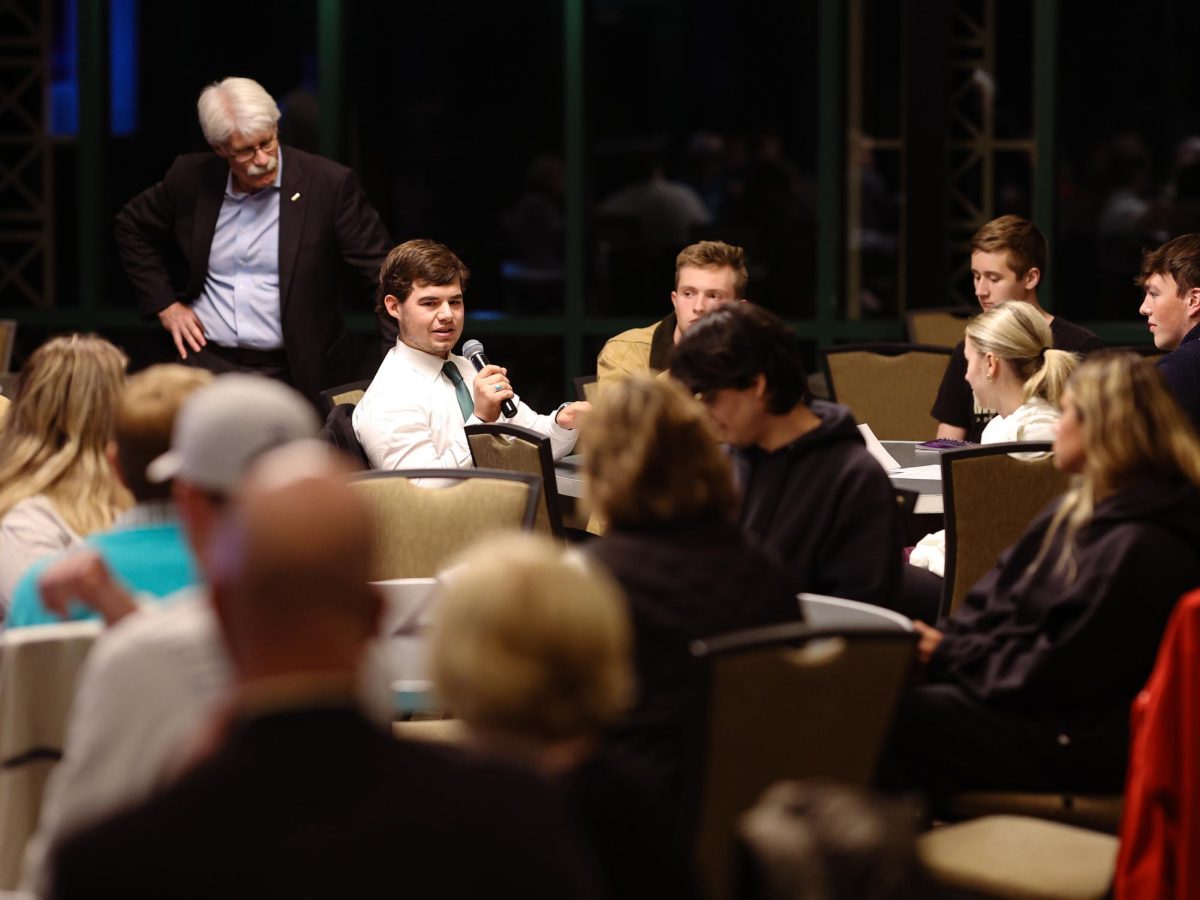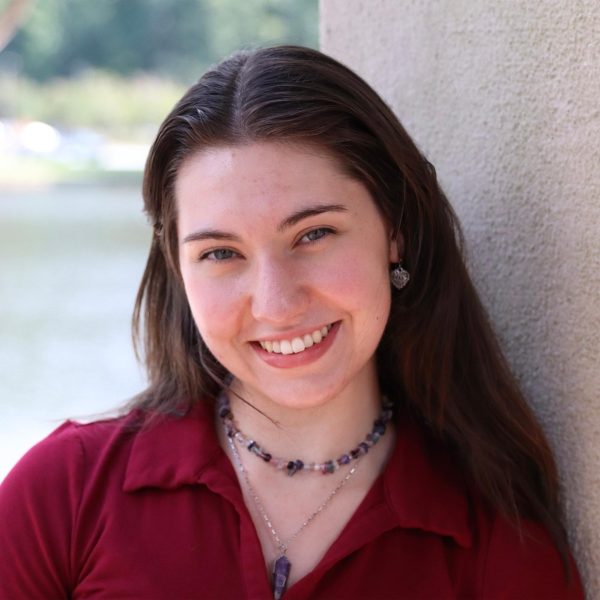In April 2023, one incident raised the question: is speech at Furman really free? The Tocqueville Society hosted guest speaker Scott Yenor, who was met with an 80-person silent protest in the Trone Student Center due to extreme comments targeting women at the 2021 National Conservatism Conference. In response, upcoming speaker Mary Eberstadt cancelled her talk at Furman, writing in a Wall Street Journal op-ed that she expected an “angry mob” that was not ready for civil discourse.
Furman President Elizabeth Davis published a Letter to the Editor in the Wall Street Journal and more clarifications on the Furman website, addressing some of her concerns with Eberstadt’s op-ed and stating that Furman has remained “steadfast in its support of the free exchange of ideas and open and civil discourse.”
“This (support) is evidenced by the wide range of speakers who have been invited and chose to speak despite encountering criticisms or opposing views,” Davis stated in the letter.
While Davis felt that Yenor and Eberstadt mischaracterized Furman’s discourse culture, others saw Eberstadt’s cancellation as a sign of an unwelcoming speech climate. Students such as FFSA advisory board member and Furman alumnus Chris Lightcap ‘24, who was a junior at the time, were in support of the speakers’ visits.
“The decision to make that call was in no small part motivated by the fact that there was a perception of a very unwelcome audience that awaited,” Lightcap said. “Things of that sort, even if they’re more so perceived risks, is just a climate that Furman as an institution of its station should not tolerate. There should be no heckler’s veto for any events.”
Lightcap is on the advisory board of the Furman Free Speech Alliance (FFSA) — a nonpartisan alumni group whose goal is to support Furman “as an outstanding contributor in the advancement of knowledge driven by a basic and unquestioned dedication to free expression and free inquiry.” Members of this group see the Eberstadt incident as a part of a larger trend.
“I think sometimes people, when they talk about the (free speech) situation today, they think it was something that just happened to Mary Eberstadt, and then this just poof, came out of nowhere,” FFSA founding member and Furman alumnus Evan Myers ‘21 said. “But people that have been around Furman for a long time will tell you that’s not the case, and it’s kind of been bubbling up for a long time.”
FFSA began after Furman alumnus Jeff Salmon ‘72 was invited to an alumni lunch with President Davis to update the community on Furman issues in fall 2022, where Davis explained demographic and financial challenges. After the meal, Salmon wrote Davis a letter, which was published on the FFSA website, outlining his main concerns about the campus. The first was the administration’s look at Diversity, Equity and Inclusion.
“Diversity, as far as I could tell from the website and what she talked about, had everything to do with race and gender and nothing to do with viewpoint diversity — diversity of political opinions (and) promotion of free speech on campus — so that you could have diverse, robust dialogue, which is really the essence of liberal arts education,” Salmon said.
His second concern was about the use of the term anti-racism on the Furman website, as he disagrees with author Ibram X. Kendi’s term. He explains his argument further in his “Letter to President Davis from a Concerned Alumnus” on the FFSA Substack.
FFSA was born with these concerns in mind and with inspiration from other alumni free speech groups such as those at Davidson, Yale and Harvard that made similar calls for action on free speech.
The alliance outlines specific goals for Furman on their website, which include encouraging the university to sponsor civil discourse events, rewrite its speech codes and introduce free expression at orientation. These goals are based on the belief that Furman lacks an open culture of discourse. While the group is non-partisan, many of their concerns focus on conservative self-censorship.
Lightcap said he often felt uncomfortable sharing his views that “cut against the grain of popular opinion” while he attended Furman.
“We feel as if there might be real consequences for saying what we candidly believe and have legitimate reasons to believe,” Lightcap said. “Overall, that was just not a good climate for people being as transparent and vocal as they could have been, especially when it comes to talking across differences with fraught matters.”
Members of FFSA cited other incidents of the Furman culture being intolerant of dissent, such as when one student held a pro-life demonstration in 2023 and was met with counter-protesters yelling profanity at him. “The nature of (the backlash) was really out of hand,” Myers said.
FFSA advisory board member and Furman alumnus Caleb Roberson ‘21 thinks incidents like these discourage people with similar views from speaking out.
“You see how people react to others when they share an idea, and in the (pro-life protest) example, that’s gonna have an adverse effect on others being willing to share similar ideas in a respectful way as well, in fear of getting a similar reaction,” Roberson said.
Bryant Garrison ‘25 is the Chairman of College Republicans and member of the Furman Conservative Society. While he thinks Furman has a better speech climate than some other schools, he still has felt discouraged from sharing his views, citing classes such as Sociology 101 and an Intergroup Dialogue class about gender expression.
“In Sociology, it was mainly a question of most of the class is taught with certain assumptions in mind, and if you do disagree with those fundamental assumptions, then you’re sort of going to be at odds with the class,” Garrison said. “My professor was very nice, but I also didn’t try to test it.”
The 2024 Presidential Election Sentiments Poll, conducted by Opinions Editor Clay Wallace, found that many students feel uncomfortable expressing conservative opinions on campus.
The administration and faculty have taken several steps to address these concerns. The On Discourse initiative began earlier this year, spearheaded by Politics and International Affairs professor Dr. Brent Nelsen and Associate Dean for Diversity, Equity and Inclusive Excellence Dr. Cynthia King. It aims to allow students to develop civil discourse skills, be exposed to different views, apply what they learn and contribute to a more inclusive culture, according to the program’s website.
King believes the initiative takes action at every level to reach this goal — through “policy, practice and culture,” King said. In terms of policy, the initiative includes the administration’s Freedom of Inquiry and Expression statement.
On Discourse also aims to help students get practice in civil discourse. “Bridging the Political Divide,” Furman’s first ever dialogue-based CLP, took place on Oct. 29 and was co-sponsored by the Riley Institute and led by Politics and International Affair professor Dr. Liz Smith and Dr. Clair Whitlinger in sociology. The event provided an opportunity for students to talk with their peers using discussion questions about how they have experienced political polarization at Furman.
Similarly, Nelsen’s Tocqueville Society hosted “American Patriotism. Discuss” on Nov. 14, in which three speakers talked about American Patriotism. Then, the audience of students and community members discussed questions with one another such as, “What is your reaction to the sentiment ‘America, love it or leave it’?”
“We model civil discourse or healthy discourse, and then we practice it,” Nelsen said. “Students were able to see smart people disagreeing over important issues, and then they were able to bring that back to their tables and discuss that amongst themselves.”
King and Nelsen think beyond-the-Q&A events like these are essential to create a broader culture of civil discourse. The On Discourse team also plans to launch a student ambassador program soon to further involve students in these events.
Nelsen has incorporated On Discourse activities into his classes this semester as well, which he also hopes will impact discourse culture. Weekly, he pairs up students with different opinions and has them discuss. Once, he chose the topic of abortion, having his students indicate if they were pro-life or pro-choice on a piece of paper.
“The class was split absolutely evenly,” Nelsen said. “(Students) found out that some pro-life people actually had a lot of pro-choice positions within their pro-life perspective, and pro-choice people actually had some really kind of pro-life perspectives within their pro-choice perspective. And so they realized, ‘Oh, these things aren’t easy. It’s nuanced.’”
In her Politics classes, Smith aims to establish a neutral political identity to foster open conversation in her classes where students do not feel the need to self-censor and, instead, “feel free to work through their ideas in an open and inclusive and welcoming environment.” She will also teach a class about civil discourse in the spring, which will include an evaluation of the Yenor-Eberstadt controversy and Furman’s response.
She noted the success of events like Pizza and Politics as an example of open discourse on campus, which is a discussion-based event series about current political issues hosted by the Department of Politics and International Affairs. “We regularly have students on the left and students on the right engaging in those conversations, and I feel like it’s a place where respect is shown across the board, and people appreciate hearing a diversity of viewpoints,” Smith said.
While FFSA is publicly supportive of the initiative and the programs included in On Discourse, they see themselves as a watchdog group of the university and want to see the university make more drastic changes as outlined on their Substack.
“We don’t want to just see (the administration) say, ‘Here, you got your statement, and here’s a little program that can shut you guys up about free speech, so move on now,” Myers said. “We’re going to make sure this actually works, that you guys are doing this the right way.”
Some current students feel On Discourse is not yet doing enough to make change. Garrison attended the patriotism CLP, but thought the structure of the event could have done more to create a cultural shift.
“I feel like it never went deep enough, and it was just too short. We were starting to have great discussions, but it had already been two hours and they had to end. Providing a space for having these sorts of long-ranging discussions would be really great,” Garrison said.
However, Garrison also noted the difficult nature of such a task.
“It’s hard to create a culture, especially on college campuses. We are much more influenced now by social media and everything else — we get siloed before we get here,” Garrison said.
As Furman continues to address its speech climate, Smith sees the national trend of polarization as a root cause of self-censorship and an inability to talk across differences, citing elite opinion leaders, the pandemic and mainstream media. However, she is hopeful of the possibility for change.
“People are feeling like their political identity is very much their personal identity, and so it can feel threatening to talk with someone who has a different opinion about how things ought to be,” Smith said. “That doesn’t mean we can’t improve things, right? I absolutely think we have a ways to go.”
Myers says that students interested in FFSA’s work can subsribe to their Substack, where they can also submit their experiences with censored speech to the group. To take part in a new culture of discourse through Nelsen and King’s program, students can attend On Discourse CLPs and will soon have the opportunity to become an ambassador of the program.












































